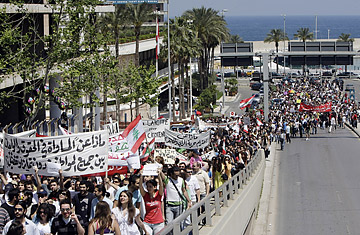
Lebanese take part in a rally calling for Secularism in downtown Beirut on April 25, 2010. Thousands of Lebanese marched to parliament in Beirut in a peaceful rally demanding the secularisation of a state long built on sectarianism.
Demonstrations are hardly unusual in Lebanon, where politics is often conducted on the streets. But the few thousand people who gathered in Beirut on Sunday to march on the country's parliament made for an unusual sight, mostly because of what was missing. There were hardly any religious symbols or sectarian political banners among them, in a country where religion and politics are practically synonymous. But those who showed up for Sunday's Secular Pride March bore no crosses, crescents or portraits of saints or martyrs; they carried only roses and the red and white cedar flag of the republic in protest at religion's domination over civil and political life in Lebanon. "What's your sect? None of your business!" they chanted.
While Lebanon has more religious diversity than any country in the Middle East — giving it a regional reputation for moderation and modernity — almost all civil matters from birth to death are governed by religious authorities rather than the state. That means, for example, that marriages between men and women of different religious backgrounds are forbidden, forcing mixed-sect couples to elope to Cyprus and Turkey in order to get married. The private religious-school system dominates the smaller public school system, and has a sectarian slant in its teaching. Jobs are doled out by the government according to sectarian quotas, and anyone who wants to run for office has to join a list controlled by a sectarian political party. "At work or anywhere else, people automatically ask you about your sect and from that they stereotype you," says Lina, a 25 year-old student who attended the march. "In Lebanon, you can't exist outside of your sect."
Pure secularism as a political movement is a relatively new phenomenon in Lebanon and the Middle East, and very much outside the mainstream. In the past, secular movements were typically tied to ethnic or nationalist ones, such as the post-colonial Pan-Arab national movements that swept the region after World War II. In contrast, Secular Pride in Lebanon doesn't yet appear to have either deep roots or a clear agenda. The marchers tended to be students from elite universities, or members of left-leaning NGOs representing a broad array of social causes such as gay rights and women's rights, but not a broad swath of public opinion. Still, despite its limited base, secularism's diagnosis of Lebanon's ills remains acute.
The powerful role of religion and the weak role of the state is in part the result of what Lebanese call confessionalism, a sectarian balance of power set up by French colonial overlords in the early 20th century and maintained by the Lebanese after independence in 1943. Under the Lebanese confessional system, all the country's positions of political power are divided among the countries 18 recognized religious groups — the president must be Christian, the prime minister must be Sunni Muslim, and the speaker of parliament must be Si'ite Muslim.
But a growing number of Lebanese say that the country's sectarian system, rather than preventing conflict between religious groups, actually encourages it, by making each sect the de-facto political rival of the other. And in the atmosphere of suspicion created by confessionalism, foreign powers have proven adept at playing Lebanese groups off against one another, resulting in cycles of war and upheaval, notably the 15-year civil war that ended in 1990, and the current standoff between Iran and the U.S. over Hizballah, the anti-Israel Lebanese Shi'ite militant group.
The question of whether or not Lebanon can move beyond the colonial legacy and evolve into a post-sectarian society is important for the whole region. The ethnic and sectarian balances around which the U.S. designed post-Sadda governance in Iraq, though less rigid and codified than Lebanon's, has had a similar effect of institutionalizing conflict and weakening the state. Many Iraqi wonder if they, like the Lebanese, are doomed to cycles of civil war.
Changing Lebanon's sectarian system, however, would require that a political class led mostly by sectarian warlords and their families dismantle the very source of their power. Even minor attempts at reform, such as a recent decision by the modernizing interior minister to allow people to strike their religious identity from their government records, have failed to achieve momentum. And in a country where not only politics, but also community and family are largely defined by religion, opting out of a religious identity can mean opting out of society. Secular Pride organizers such as Alexander Polikevitch hope that Internet social networking will help fill some of the vacuum. Polikevitch and his friends tested the idea of a secular movement on Facebook page, and its page immediately drew 3,000 members. But while they may feel less isolated than before, they are divided on how best to pursue their goals: Should they try and enter the political process by having secularism recognized as one of Lebanon's religious groups, or would that simply reinforce the system they want to change? "The achievement of our goals will be a long time coming, in 20 years perhaps," said Polikevitch. Whether Lebanon has that much time before the next war breaks out remains to be seen.
With reporting by Tarek Tutunji in Beirut
